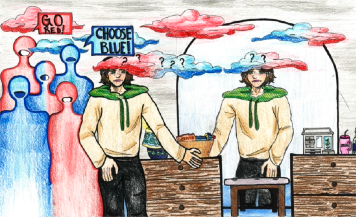African American Studies should be offered at Kaneland High School
In 2014, The United States hit a milestone with Latino, African American and Asian students surpassing the number of white students in public schools. Diversity surrounds us, which makes learning and experiencing it early in life necessary to thrive in today’s world.
Most public high schools in America require Human Geography, United States History and Government as graduation requirements. At Kaneland High School, there are also several social studies electives students can choose to take, which consist of Armed Conflict, World History One and Two, Psychology and Sociology. While these electives are great, there is no option for more diverse learning opportunities.
Kaneland is a historically white district and currently, the student population is 77.8% White. This does not mean, however, that a class like African American Studies doesn’t need to exist in our school. Learning about your own identity is extremely important, but it is just as important to learn about the history and uniqueness of people outside of this school. In the real world, we will interact with people of all different races and cultures, so if Kaneland wants to graduate all students “college, career and community ready”, wouldn’t an African American Studies class help make that possible?
When students get to high school, they are given more freedom and start to form their own opinions, so with that responsibility, school is the perfect place for young people to learn about themselves and, most importantly, what makes us different.
In my eighth-grade history class at the middle school, we had a unit on Black history. I enjoyed the unit, but I wish my class would have spent more time learning about Black history and other cultures. I know it would have ultimately only expanded my knowledge and opened my and my classmates’ minds to new ideas.
According to a study by the National Museum of African American History and Culture, teachers often say they incorporate Black history into all classes. However, when the study looked at how time was actually used in the classroom, it revealed something different. On average, only about 8 to 9 percent of class time is devoted to Black history. This doesn’t give students enough time to learn everything about the culture.
KHS social studies teacher Steve Auchstetter loves his job and enjoys seeing his students learn and succeed. He thinks that learning about diversity is extremely important in school and thinks that Kaneland could benefit from a class specifically geared toward a specific culture.
“When students learn about other cultures, it opens their eyes to a whole new world. They become more confident when interacting with someone from another culture,” Auchstetter said.
Without the integration of diversity in school, students can face challenges later in life when interacting with people of all different backgrounds. 96 percent of major employers say that it is vital that employees are able to work with people from diverse backgrounds. In the long run, a class like African American Studies would benefit students by allowing them to thrive later in life in our culturally diverse workforce.
Personally, I would jump at the opportunity to take an African American Studies class if it was offered at Kaneland. While learning about diversity throughout our entire world is important, an African American Studies class would be just the right first step in providing students at Kaneland with more diverse learning opportunities.
“Teaching a class on African American Studies would be something I would consider. I think there would be interest in the student body here,” Auchstetter said.
The College Board has recently developed its first AP African American Studies course, and within the next few years, the class will begin to be offered at schools throughout the United States. Oftentimes, in the classroom, students are taught only the ugly sides of African American history. In this course, however, students will be taught the history, literature, arts, geography and science of African American history.
In more recent news, Governor Rob DeSantis of Florida wants to ban AP African American Studies from schools. He says that the course is “historically inaccurate” and “lacks educational value.” But how is this course “inaccurate” and “lacking value” when the very information of the course comes from Black perspectives which is exactly what history classes need?
While DeSantis and many of his supporters believe that the course is not necessary, this does not mean that it should be banned. Schools along with the students should be left to be able to make that decision.
Our current young generations are the future of our entire workforce. They are the next teachers, politicians, doctors and beyond. With more young people getting involved in activism on various forms of social media, I can already see change beginning to form in my peers. More teenagers my age, including my friends and I are becoming more comfortable with sharing our opinions on social media. If our current generations can continue this learning process, our world will begin to see a change. The more informed we are as a human race, the more open-minded, accepting and understanding we will be to others rather than fearing what is unfamiliar to us.

Name: Carli Filek
Position: Social Media Executive
Graduation year: 2025
A few sentences about me: In my free...






